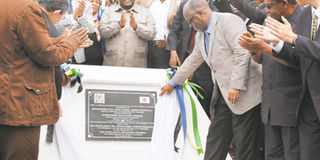Magufuli has tied his legacy to infrastructures

President John Magufuli lays the foundation stone to launch the construction of the Tazara fly over. He has since launched several multi-billion infrastructural projects in the country.
PHOTO |FILE
What you need to know:
- Sokoine lived and worked in the times of Mwalimu when the country saw its future accomplished through the policies of Ujamaa, inspired by the East especially China, which failed to deliver the economic miracles to propel us out of humiliating poverty but delivered a country with principles and values; a country where the sense of accomplishment was more than economic gains.
While launching the Dar es Salaam-Morogoro SGR line project, on the day Tanzanians remembered the passing of its former prime ministers, Edward Moringe Sokoine who perished in a road accident in 1984, President John Magufuli left no doubt, once again as to where his vision of the future of the country lies.
Sokoine lived and worked in the times of Mwalimu when the country saw its future accomplished through the policies of Ujamaa, inspired by the East especially China, which failed to deliver the economic miracles to propel us out of humiliating poverty but delivered a country with principles and values; a country where the sense of accomplishment was more than economic gains.
Mwalimu managed to instill in us a sense of nationhood; something which eluded his peers in other countries leading to bloodbaths in post-colonial Africa.
President Ali Hassan Mwinyi lived in the shadow of Mwalimu throughout his decade in office and sought to achieve the economic success which had eluded his successor. Mwinyi opened up the country and sought to allow conversation about political pluralism and the nature of the Union. While political pluralism was achieved the conversation on the nature and future of the Union failed, as did economic success even though under his watch there was an economic boom in some sections of the society.
Then came the most globalist president this country has ever had who sought to instill discipline in revenues and spending; one who told us there was no “freedom without limits”, and reformed the civil service. President Benjamin Mkapa campaigned hard for highly indebted countries to be forgiven their debts so that they can rebuild their economies. He privatized much of the economy and opened it up to foreign investors. Under the academic spoken and aloof Mkapa, the country embarked on infrastructures to connect the country as a way to spur economic growth.
The period of what his critics on the left have called “accumulation by dispossession” started with Mkapa through economic diplomacy. He used the analogy of a drunk man who could not tell whether the car was moving forward or not to answer his critics.
President Jakaya Kikwete was the first president to govern in the truly digital age, whose presidency was hugely supported by the youths who thought he understood them better than his predecessors. Under Kikwete was largely open to debates and discussions. He tried his hands on many things like the new constitution and carefully balancing the competing interests within his party. Perhaps the most successful story under him was increasing the chances of youths to college and university education.
He travelled a lot. And had a thick skin when it came to criticisms and insults thrown at him to the point his political opponents said the country needed a “dictator” to get things moving in the right direction.
Which brings us to President Magufuli.
Another president who seems to draw his inspiration from the East and its dragon and economic tigers and everything else in between like Turkey. Most of these countries did not achieve economic success while being models for Western democracy at the same time. Even the new embassies he launched were for countries in Africa and the East.
During the launching of the Dar-Moro SGR line project he returned to what has become common themes of his presidency. He has little patience for what he considers small talk. Using the analogy of a lorry driver in the countryside, he said he is not bothered by his passengers’ talks and singing; he is focused on the road. His road map is the election manifesto of his ruling CCM. Clearly he is a man not in the mood for conversations in the digital age.
Magufuli is at ease with infrastructures. And as his second year in office is rolling by, this is the sector which he can confidently point to as a success story. Even though some infrastructure projects predate his presidency, he was in charge of them before his presidency. At every ceremony involving infrastructure project from the oil pipeline from Uganda to the latest project he has gone to great pains to outline the economic rewards to people and the country.
Each president with his mandate and his time. There is little doubt that President Magufuli has tied his legacy with infrastructures.




